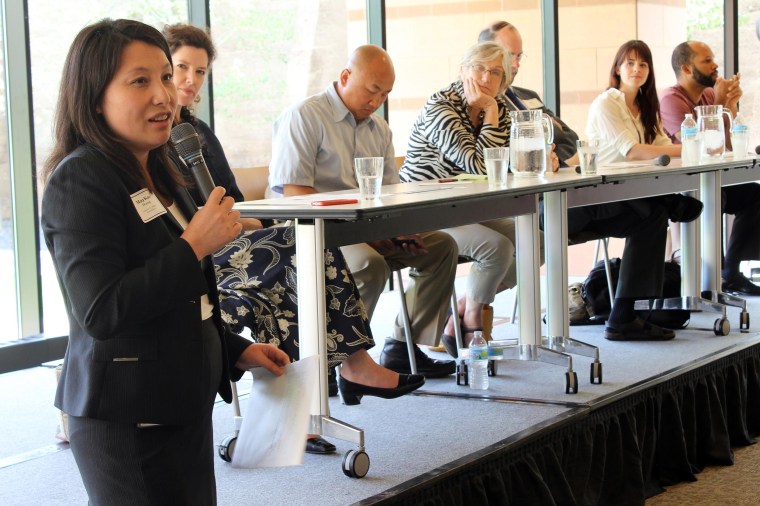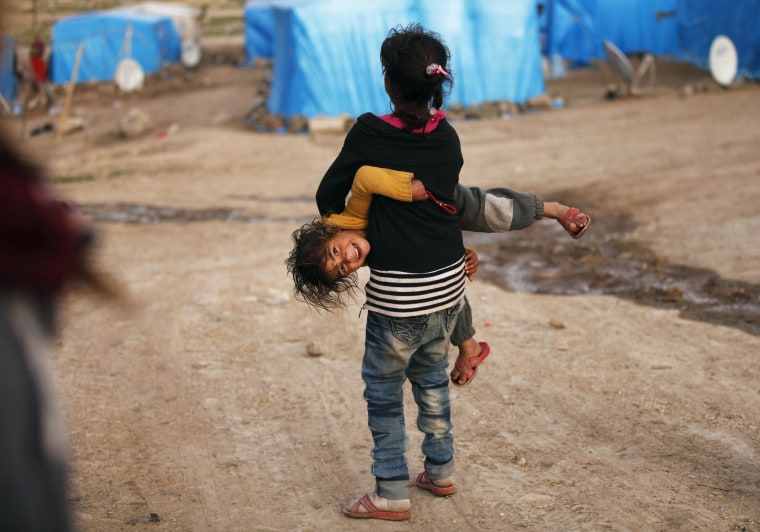It was a village of lepers who saved the Yang family as they fled their village in Laos amid the communist takeover of the country in 1975.
Nearly 40 years later, the memories can still make MayKao Hang (her married name) cry. But she hopes her story of resilience can point the way to helping the latest crop of kids to suffer from war, displacement and disruption — the children of Syria.
A new report released by UNICEF this week finds that more than 5.5 million Syrian children have missed out on medical attention, a safe home, food or schools since the civil war started there three years ago.
Even if the war stopped tomorrow, they would bear physical and mental scars for life.
For many, the trauma will fester, research on past survivors suggests, turning into mental illness or even physical pain. And even for success stories like Hang, the pain of war and displacement is hard to get past.
“Trauma is not something that you overcome. It’s just something that you live with,” says Hang, now president and chief executive officer of the Amherst H. Wilder Foundation, which helps troubled children and their families in St. Paul, Minn.
“Trauma is not something that you overcome. It’s just something that you live with.”
Childhood trauma is among the biggest risk factors for mental disorders and depression, says Dr. Kerry Ressler, a psychiatrist specializing in fear, anxiety and trauma at Emory and the Howard Hughes Medical Institute.
One of the first and most lasting symptoms may be insomnia, says Kristin Bulin, executive director for the Center for Survivors of Torture & War Trauma in St. Louis. “They don’t feel safe, so they don’t sleep.” That leads not only to tiredness, but anxiety and an inability to think clearly.
Survivors often develop physical symptoms such as backache, headaches and even migraine. They suffer from intrusive thoughts — memories about a traumatic event that won’t go away, and even flashbacks, when for a few moments they are literally reliving the terror.
But researchers are also discovering clues to how to help kids recover. Ressler says there are behaviors that predict whether a person will do well after surviving a traumatic event.
“Like avoidance,” he said. “Avoidance of scenes that remind people of the trauma, or avoidance of other people. We know that … if you stop avoiding and do the thing you are afraid of, you can overcome that.”
Therapy can help kids get over that fear before they start developing dangerous behaviors, Ressler says.
But it must be handled carefully. Hang remembers when well-meaning teachers showed her fifth-grade class a film about the Vietnam War. “I burst into tears, crying,” she says. “I didn’t know why I was crying. That often happens to children who have survived war. People are trying to be nice to them, and they open up a new wound.”
Hang still chokes up at the memory of fleeing her home village in Laos, then being ambushed and shot at by Communist rebels in the midst of a monsoon. They survived only because they stumbled into a village of people with leprosy who belonged to the same Hmong ethnic group as her family. “Lepers saved our lives. They sheltered us and took care of us,” says Hang.
It took more than a year to get to a new life in the United States, after a trek over the mountains and into Thailand, and then a miserable time living mostly outdoors in refugee camps. Finally, in 1978, two young women sponsored Hang’s family. She was just 6.
One factor working in Hang’s favor: Most of her family stayed together. Research shows that preserving family structure can help keep kids together mentally.
“There’s a lot of capacity for resilience, given opportunities, given the support of other people,” says child psychologist Ann Masten of the University of Minnesota, who’s treated survivors of the killing fields of Cambodia among other refugees. “It is clearly easier if they are moving with their families or with a close-knit group of people.”
A loss of trust can cause some of the most debilitating effects, Ressler says — whether it’s a child abused by a parent, or a child who’s survived a government attack on her village.
“For kids, their primary relationships are their families so if their family is together, it can buffer those risks,” Ressler said.
Some kids in fact seem to be made stronger by their survival, Ressler said. The key in those cases is having a sense of control over their lives. “They have strong family support, a sense of mastery or a sense of positive emotions,” he said. “One can go through a lot of trauma but still come out and feel some level of control over one’s survival.”
Hang feels that. “One thing that helped me was having really high expectations from the people in my life about what I could achieve and accomplish,” says Hang. All five of her brothers and sisters finished college, and Hang went to Brown University on a full scholarship even after years of poverty.

Little things helped, too, like an art prize she won in seventh grade, Hang says. “High self-esteem boosts resiliency," agrees Amy Richmond of Save the Children, whose organization issued its own report this week on Syrian kids.
But kids need help getting there. Their basic needs must be met first, Hang and the other experts agree. “Maybe all a kid needs is to have his next meal taken care of so he can pay attention in school for the day,” Hang says.
How you can help Syria's children
What helps most is giving children structure — predictable routines, places, activities, chores. This can happen even in the chaos of a refugee camp, Ressler says.
“There is something about that sense of stability, that sense of predictability, that can add a lot to an otherwise difficult world,” he said.
Save the Children sets up safe spaces for kids to play. They train fellow refugees to boost the kid’s confidence in a loving way — training that can follow the children and their adult caregivers into a new life.
Genes are also clearly involved in making people resilient. There’s a batch of genes linked with PTSD and anxiety, including two that appear to help regulate the production of stress hormones. And about a decade ago, researchers found a gene that made people more prone to depression after a serious life event.
Cultural factors count, too. Research shows kids who keep a familiar connection to spirituality, moral values and a sense of hope fare better.
People who are encouraged to keep their own cultural values tend to do better, Masten said. A study of Sri Lankan refugees showed that orphans often said embracing their culture’s Buddhist ideals helped.
But most of what helps seems to come from within, Masten says, “The people who weren’t resilient died,” she said.
Research also shows the trauma of war doesn’t stop with the victims who live through it. A growing body of evidence suggests that mental trauma may be passed down from one generation to the next. Ressler led a highly publicized study last year in which mice appeared to have inherited a fear about a specific odor from their fathers.
Parents can pass along their anxiety in other ways, too. “Even if parents are consistent, if they are nervous and anxious, the kids can watch and learn from that,” he said.
“Half the children we work with are born here but still become individuals of secondary trauma,” said Bulin. "It just seeps over into their lives."
